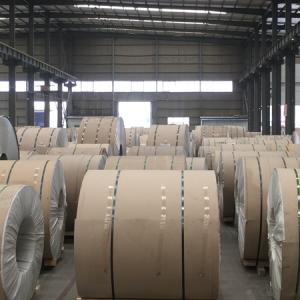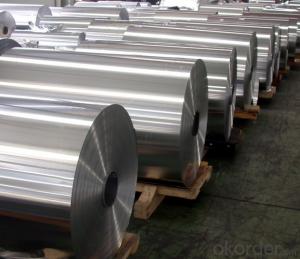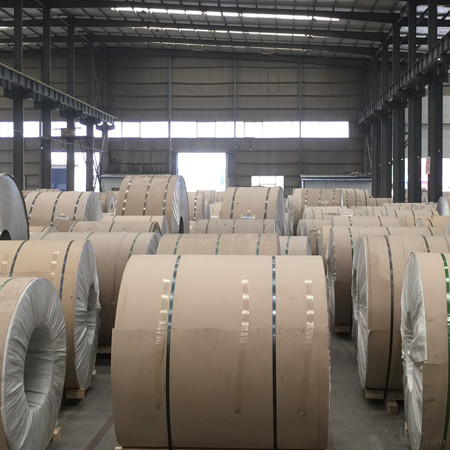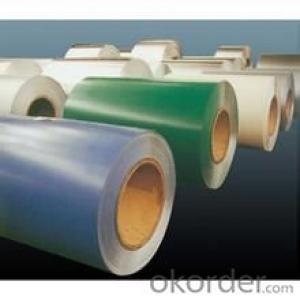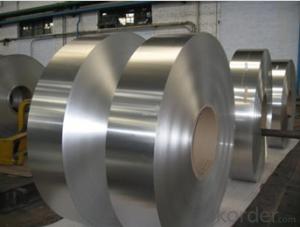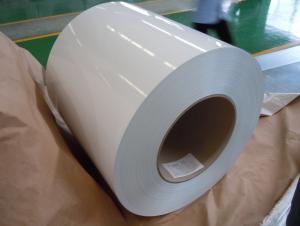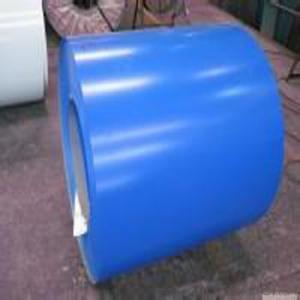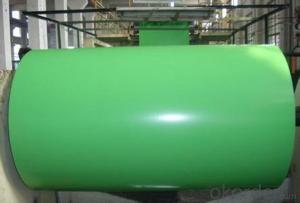Wholesale Painted Aluminum Coil for Automobile Components
- Loading Port:
- Shanghai
- Payment Terms:
- TT OR LC
- Min Order Qty:
- 5 m.t.
- Supply Capability:
- 60000 m.t./month
OKorder Service Pledge
OKorder Financial Service
You Might Also Like
Specification
Color Coated Aluminium Roll For Automobile Components
Specifications
1060, 1100, 3003, 8011, etc. | |
Temper | H16, H18, H24, H26, H28 |
Thickness | From 0.05mm to 3.0mm |
Width | Standard width:1240mm |
Special width:1300mm, 1520mm, 1570mm, 1595mm | |
Diameter | Standard dia:1200mm |
Interior dia:150mm,405mm,505mm | |
Weight | 2.5 T/coil,3.0 T/coil |
Coating | PE, PVDF, ACRYLIC |
Surface | Embossed, mill finish, coated |
Color | AS to code RAL |
Gloss | 10-90%(EN ISO-2813:1994) |
Coating Thickness | PE: more than 18 micron |
PVDF: more than 25 micron | |
Coating Hardness(pencil resistance) | More than 2h |
Coating adhesion | 5J (EN ISO-2409:1994) |
Impact Resistance | No peeling or cracking(50 kg/cm,ASTMD-2794:1993) |
Flexibility(T-bend) | 2T |
MEK resistance | More than 100 |
Advantage | 1.High temperature resistant 2.Weathering resistant 3.Scrubbing resistant 5.Acid or alkali proof 6. Fireproof 7.Light weight material is easy to construct and install |
Out package | Wooden splint with export standard |
Application | ACP, wall cladding, facades, roofs and canopies, ceilings, signboards, blind window, display platforms, electrical panels, etc |
Characteristics
1) Excellent weather-proof durability
2) Anti-ultraviolet
3) High erosion resistance
4) Stable color and gloss
5) Good mechanical processing performance
6) Abrasion resistance
7) Anti-impact
8) High flexibility
Application
1) Construction material further processing
2) Solar cell frame, solar battery frame
3) Glass curtain wall frame
4) Interior decoration
5) Elevator decoration
6) Signs, nameplate, bags making.
7) Automobile parts material
8) Office and Household appliances: HVAC equipments
9) The consumer electronics: mobile phones, digital cameras, MP3 .etc.
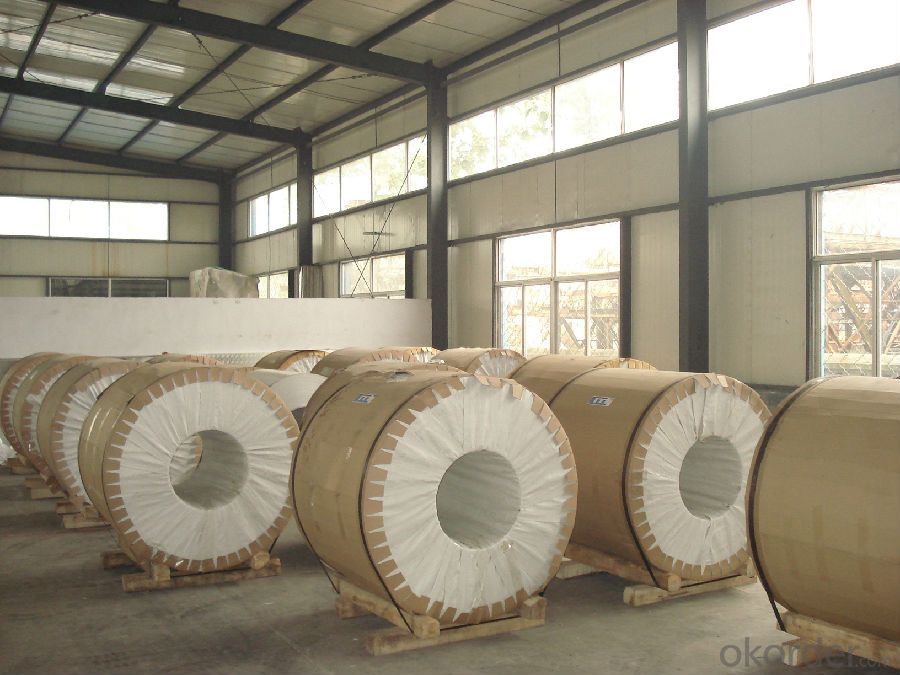
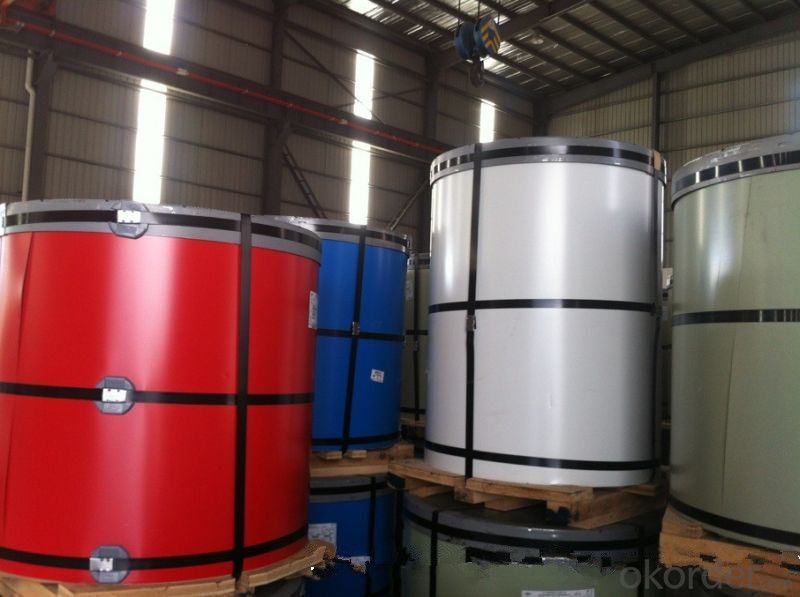
- Q: Can aluminum coils be used in roofing applications?
- Aluminum coils are indeed suitable for roofing purposes. The lightweight, corrosion-resistant, and durable properties of aluminum make it a popular option for roofing. In the construction of various roofing systems like standing seam roofs, metal shingles, and flat roofs, aluminum coils are commonly utilized. These coils are typically shaped into panels or sheets, which are then installed on the roof, offering protection against weather conditions and enhancing the overall appearance of the building. Moreover, the reflective attributes of aluminum play a role in reducing energy consumption. By deflecting sunlight and heat, this environmentally friendly roofing choice helps in conserving energy.
- Q: How do you store aluminum coils to prevent damage?
- To prevent damage and store aluminum coils effectively, there are several important steps that can be taken. First and foremost, it is crucial to maintain a clean, dry storage area that is completely free from moisture and humidity. Moisture can gradually corrode the aluminum coils and cause significant damage over time. Secondly, it is advisable to store the coils in an upright position, preferably on pallets or racks, in order to avoid any bending or warping. By keeping them upright, the risk of coil deformation is minimized, ensuring that their shape remains intact for future use. Furthermore, it is recommended to shield the coils from dust, dirt, and other contaminants by covering them with a protective material such as plastic or tarp. This protective layer not only safeguards the coils from external particles but also isolates them from any potential chemical exposure that could accelerate corrosion. Additionally, it is of utmost importance to handle the coils with care during the storage process to prevent dents or scratches. Rough handling or accidental dropping can result in physical damage. Therefore, appropriate lifting equipment like forklifts or cranes should be used when moving or stacking the coils. Lastly, regular inspections should be carried out to check for any signs of damage or corrosion during storage. By conducting visual checks on a periodic basis, any issues can be identified early on, allowing for necessary interventions to prevent further damage. By adhering to these storage practices, damage to aluminum coils can be effectively prevented, ensuring their longevity and preserving their quality for future utilization.
- Q: I have a broken exhaust stud in my engine head. I have an aluminum head but the stud is steel. The stud broke a little below the surface. I want to mig weld a washer to the stud, but will the weld stick to the aluminum or will it blow a big hole in the head? I will only be using a little 110 mig welder.will I be okay or will that lead to more problems?
- Drill out the stud, extract the broken stud, refresh the threads and install a new stud. You'll ruin the head if you attempt to weld.
- Q: What are the different coil leveling options available for aluminum coils?
- There are several different coil leveling options available for aluminum coils, depending on the specific requirements of the application. 1. Roller Leveling: This is a common method used to flatten aluminum coils. It involves passing the coil through a series of rollers that apply pressure to the material, gradually reducing its thickness and leveling out any imperfections. Roller leveling is efficient for achieving flatness and can handle a wide range of coil sizes and thicknesses. 2. Stretch Leveling: This process involves stretching the aluminum coil in a controlled manner to remove any residual stress and improve its flatness. The coil is passed through a series of powered rollers that stretch and elongate the material, resulting in a more level and stable product. Stretch leveling is particularly effective for thicker and wider coils. 3. Tension Leveling: This method uses tension to remove any waviness or unevenness in the aluminum coil. The coil is passed through a series of bridle rolls that apply tension to the material, effectively flattening it out. Tension leveling is commonly used for thinner gauges of aluminum and can handle high-speed processing. 4. Precision Leveling: This is a specialized leveling process that is often used for high-precision applications where extremely flat and uniform coils are required. Precision leveling involves using a combination of roller leveling, stretching, and tensioning techniques to achieve the desired flatness and eliminate any imperfections in the material. This method is commonly used in industries such as aerospace, automotive, and electronics. Overall, the choice of coil leveling option for aluminum coils depends on factors such as the desired flatness, coil thickness, width, and the specific requirements of the application. Each method has its own advantages and limitations, and it is important to select the most appropriate option to ensure the highest quality end product.
- Q: This question asks about the potential health impacts of aluminum coils, which are commonly used in various industries and products.
- <p>Aluminum coils themselves are generally considered safe and do not directly affect health when used in their typical applications such as construction, electrical components, or food packaging. However, there is ongoing debate about the potential health risks of aluminum exposure, particularly when ingested. Some studies suggest a link between aluminum and neurological disorders like Alzheimer's disease, though this is not conclusively proven. It's important to note that aluminum is a common element found naturally in the environment, and the human body can naturally excrete small amounts. The use of aluminum coils in food packaging is regulated to ensure safety, and the risk of aluminum toxicity from these sources is considered low.</p>
- Q: The user is inquiring about the possibility of reusing their old aluminum coils or purchasing used ones.
- <p>Yes, you can reuse your old aluminum coils if they are still in good condition and meet the required specifications for your application. Reusing can be cost-effective and environmentally friendly. When buying used coils, ensure they are from a reputable source and have been properly inspected for any damage or wear that could affect performance. It's crucial to verify the coils' integrity and functionality before use to avoid any potential issues in your manufacturing or production process.</p>
- Q: What are the various surface finishes available for aluminum coils?
- There are several surface finishes available for aluminum coils, including mill finish, brushed finish, embossed finish, anodized finish, and coated finish.
- Q: wikipedia says welding aluminum by means of stick welding is possible but i have always been told TIG is the only way to weld aluminum. what do i need in order to stick weld aluminum? BTW i have a Lincoln Electric AC 225 Stick Welder
- Aluminum Stick Welding
- Q: Can aluminum coils be used for window frames?
- Certainly, window frames can indeed be made using aluminum coils. Aluminum is widely favored for window frames owing to its enduring nature, lightweight composition, and ability to resist corrosion. It is extensively employed in both residential and commercial settings. Aluminum coils can be effortlessly molded and adjusted to accommodate diverse window dimensions and designs. Additionally, aluminum frames provide exceptional thermal insulation qualities, thereby enhancing energy efficiency in structures. All in all, aluminum coils represent a dependable and pragmatic choice for constructing window frames.
- Q: Are aluminum coils more expensive than other coil materials?
- In general, aluminum coils tend to be pricier compared to other coil materials. This is primarily because the production cost of aluminum is higher than that of metals like copper or steel. Moreover, aluminum coils command a higher price due to their exceptional resistance to corrosion, lightweight properties, and superior thermal conductivity. It is important to consider that the cost may fluctuate depending on variables like the coil's thickness, size, and specific usage.
Send your message to us
Wholesale Painted Aluminum Coil for Automobile Components
- Loading Port:
- Shanghai
- Payment Terms:
- TT OR LC
- Min Order Qty:
- 5 m.t.
- Supply Capability:
- 60000 m.t./month
OKorder Service Pledge
OKorder Financial Service
Similar products
Hot products
Hot Searches
Related keywords
